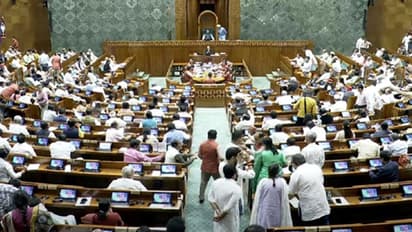Waqf Act comes into effect from today, Centre issues notification

Synopsis
The Waqf (Amendment) Act, 2025, has officially come into force on April 8, amid strong political and legal debates. The law mandates digital record-keeping and sets timelines for waqf property dispute resolution.
The Waqf (Amendment) Act, 2025, officially came into effect on Tuesday, April 8, following a notification issued by the Central Government. The Ministry of Law and Justice confirmed the implementation date through a Gazette notification.
The legislation, which aims to overhaul the governance of Waqf Boards across India, was passed during the recently concluded Budget Session of Parliament. It cleared the Lok Sabha on April 3, followed by the Rajya Sabha on April 4 after a marathon 13-hour debate. The Bill received the President’s assent on April 5.
Also read: Supreme Court to hear 15 pleas against Waqf Act on April 16 amid political row
The government has positioned the amendments as “historic reforms” intended to promote transparency, streamline administration, and ensure accountability in waqf property management. However, the Act has triggered significant backlash from opposition parties and several Muslim organizations, who argue that it undermines minority rights and paves the way for increased state control over religious endowments.
A total of 15 petitions challenging the constitutional validity of the Act have been filed, and the Supreme Court is scheduled to hear them on April 16.
The Waqf (Amendment) Act, 2025 introduces a range of reforms aimed at improving transparency and governance in the management of waqf properties across India. Among its key provisions are mandatory periodic audits of waqf boards and penal action against financial mismanagement or violations of the Act's guidelines.
Significant changes have also been made to the composition of local waqf management committees. The amended law mandates representation from donor families and beneficiaries, aiming to bring more accountability and inclusivity into the decision-making process.
The Narendra Modi government has pitched the law as a major reform to unlock the potential of waqf assets, many of which it says remain underutilised due to corruption, legal disputes, and administrative inefficiencies. By ensuring better oversight, the government claims the revenue generated from these properties could be channelled towards community welfare, with a special focus on empowering women. Some of the key amendments include:
- Inclusion of non-Muslims in Waqf Boards
- Reserved seats for women, as well as members of the Shia, Pashmanda, and Bohra communities
- Central government’s authority to set rules for registration and audit of waqf board accounts
In addition, the Act mandates the establishment of designated waqf tribunals to resolve disputes through a time-bound mechanism, aimed at expediting long-pending cases involving waqf properties.
Also read: Chaos in J&K Assembly over Waqf Act, PDP MLA Waheed Para marshalled out (WATCH)
Central government today also filed a caveat plea in the top court, requesting it to hear the government in the petitions filed before it challenging validity of Waqf (Amendment) Act, 2025. A Caveat plea is filed by a litigant to ensure that no adverse order is passed against them without being heard.
While the government insists the reforms will benefit the community through better governance and social welfare delivery, critics argue that provisions such as allowing non-Muslims and women on waqf boards compromise the autonomy of religious institutions.
Stay updated with the Breaking News Today and Latest News from across India and around the world. Get real-time updates, in-depth analysis, and comprehensive coverage of India News, World News, Indian Defence News, Kerala News, and Karnataka News. From politics to current affairs, follow every major story as it unfolds. Get real-time updates from IMD on major cities weather forecasts, including Rain alerts, Cyclone warnings, and temperature trends. Download the Asianet News Official App from the Android Play Store and iPhone App Store for accurate and timely news updates anytime, anywhere.